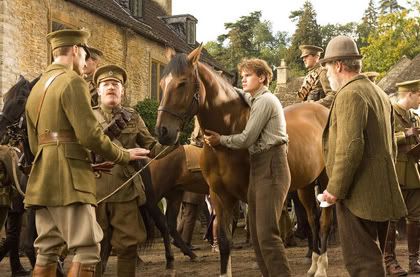
Steven Spielberg sure knows how to lay it on thick. "War Horse" is unabashedly old-fashioned filmmaking and makes a bold announcement of being such. It's a Spielbergian film through and through with no room for understatement. John Williams' bombastic score and Janusz Kaminski's lush cinematography know exactly what they're going for. Technically speaking, the movie is the epitome of perfection. Spielberg is a master of the craft and knows how to tug on the heartstrings and jerk some tears. I, however, don't like to be yanked on for an emotional response. Spielberg and his team certainly know how to solicit those responses, but they don't disguise their technique one bit. All of the components are there, but it's too obviously manufactured and labels the film as what it might really be -- Oscar-mongering.
Adapted from the London stage play, it's the tale of a boy who raises a horse, loses him in the dawn of World War I and yearns for his return. We begin on a quaint farm where a drunkard farmer (Peter Mullan) bid on a race horse he thought could be turned into a plow horse. He brings the horse home to his infuriated wife (Emily Watson) who believes because of her husband's stupid actions they'll lose everything. Their teenage son, Albert (Jeremy Irvine), however, has faith in the new horse. He raises the horse as his own, names him Joey and strives to protect him from harm. Desperate for money, Albert's father sells Joey to the war effort and so begins our episodic journey following this noble steed.
From its initial setup, the film is painterly, picturesque, and every shot is established like a fine portrait. This carries through into the war sequences which are eloquently shot against the carnage. Each sequence following Joey's departure into the war front plays out like an individual vignette giving the film a disjointed feeling with drastic tonal shifts. But two instances stand out among the rest. One is when a French farm girl (Celine Buckens) comes into possession of Joey with her elderly grandfather (Niels Arestrup), and the other is when an English and German soldier call a truce to help Joey who's entangled in barbed wire. Separate moments such as these work wonders but struggle in aiding to the cohesiveness of the picture as a whole.
A detachment occurs once Joey leaves the farm, a detachment from any central character to anchor the narrative -- no, the horse doesn't count. Even Jeremy Irvine as Albert is absent for too long to give us the emotional connection we need, the tether that keeps us rooting for Joey to find his way back to his beloved owner. But boy, Spielberg sure does try to make that connection in any way he can with overbearingly beautiful skies and landscapes, heroic angles and spot-on musical cues, all which still can't make up for a dramatic flatness.
And for all this negativity toward "War Horse," it's still fine entertainment. It's just all too obviously constructed and drenched in sentimentality using every aesthetic approach in the book. It's too bad the narrative isn't allowed to more openly and organically speak for itself instead of slamming us with trite schmaltz. The story instead lives behind a shielded coating of gloss not allowing us to become truly invested as much as Spielberg clearly thinks we should.






No comments:
Post a Comment